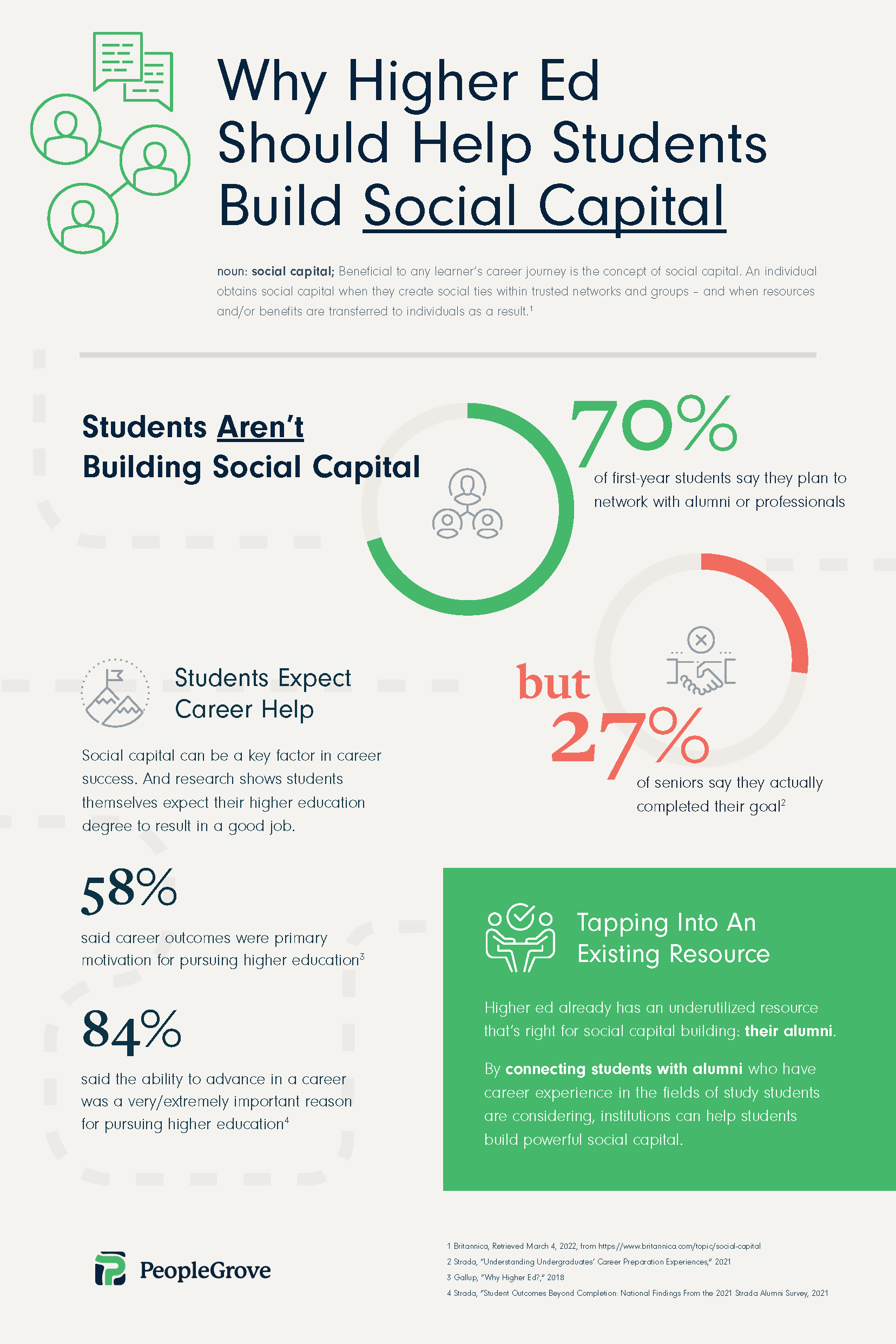Networking & Mentorship
Closing the Social Capital Know-How Gap
A Learner First Approach to Giving the Definition of “Mentorship” a Hard Refresh At the end of 2021, Strada released […]
Networking & Mentorship
A Learner First Approach to Giving the Definition of “Mentorship” a Hard Refresh At the end of 2021, Strada released […]

At the end of 2021, Strada released the results of a survey of over 55,000 students. The survey asked the students to identify which activities they planned on doing or have already done. When looking at the data from first-year students and from those about to graduate, a stark gap emerged.
Students enter their higher ed experience with the best of intentions, particularly when it comes to their careers. They understand that networks and social capital are important and so 70% of first-years said that they intended on networking and building relationships with alumni.
However, only 27% of graduating students said they actually built those relationships. A difference of 43%!
What’s causing this gap? Why aren’t students following through on their good intentions?
“Most students just don’t know the ins and outs of networking,” said Carol Bassie, inaugural director of Drew University’s Center for Mentoring and Professional Networks. “We have all sorts of events on campus that give students the opportunity to build relationships and find mentors. But only a few students really show up with a plan.”
It’s a common sentiment expressed across higher education administrators. Like Carol, most can point to networking events they’ve planned where a third of the students attack the event and shake every hand possible, a third of the students linger around nervously, and the final third just came from the free food.

It’s the creation of this networking plan where students struggle, for the simple reason that most don’t know what they want to do yet. And that’s OK! With the twists and turns careers take, there are countless examples of successful people who are in a role that they never dreamed of when they were in school, let alone could actually plan for.
Without a specific plan, the assumption is that students approach these networking events in search of a mentor. A mystical, magical being who is going to guide them through the hero’s trials they are sure to face in their quest for the career that gives them purpose and a good income. When they leave the event without their Yoda, they are disappointed, discouraged, and disheartened. They’re unlikely to try again.
But is advice really what students want or need? Author and professor Eric Koester doesn’t think so. “When I ask people about their negative mentoring experiences,” Koester writes, “they almost always come down to the fact that they were hoping their mentor might help them find a job or make an introduction or provide them an opportunity, and instead they just got unwanted advice.”
Instead, in his upcoming book Super Mentors, written in collaboration with PeopleGrove Co-Founder and CEO Adam Saven, Koester offers a model to help learners create a powerful network of relationships that get them what they are really looking for — opportunity.
The model starts with something more tangible for learners than figuring out what they want to do with their lives. It starts with a project. A project “offers a low-risk way to build evidence of your qualifications, skills, and abilities,” says Koester.
It also gives the learner a chance to start small. Instead of asking for life advice, they are asking for a direction to take their book, podcast, article series, or business plan. And by the way, projects like these are proven to improve student confidence in their ability to be successful in the job market. Feeding two birds with one scone.
This is why PeopleGrove has woven projects into the core experience of the product. As learners discover and subsequently explore different career paths, the platform offers real-world and simulated opportunities for them to actively put their skills to the test and build new ones. These projects also provide a way for learners to build their social capital effectively and find their “Super Mentors.” It gives them a networking plan.

The best part? These projects are sourced from the community. Alumni, employers, and other knowledge-sharers are encouraged to use one of many project templates to offer these opportunities to knowledge-seekers.
Back to the networking event. Imagine that students were required to have a project idea before coming to the event, or have signed up for a project in PeopleGrove. It doesn’t have to be in progress or even fully formulated, but they have to have some ideas. Alumni or other community members acting in the mentor role are made aware that this is the case. Now when a student approaches an alum, the first question the mentor asks isn’t “what do you want to do with your life?” it’s “what are you working on?”
A small start can open all sorts of doors for learners. And maybe down the road, they’ll even find their Yoda.
For more on PeopleGrove’s Learner First Approach and why career outcomes are core to the new definition of student success, download our free E-Book.
Subscribe to our newsletter to be one of the first to be notified of the release of Super Mentors, publishing this spring.